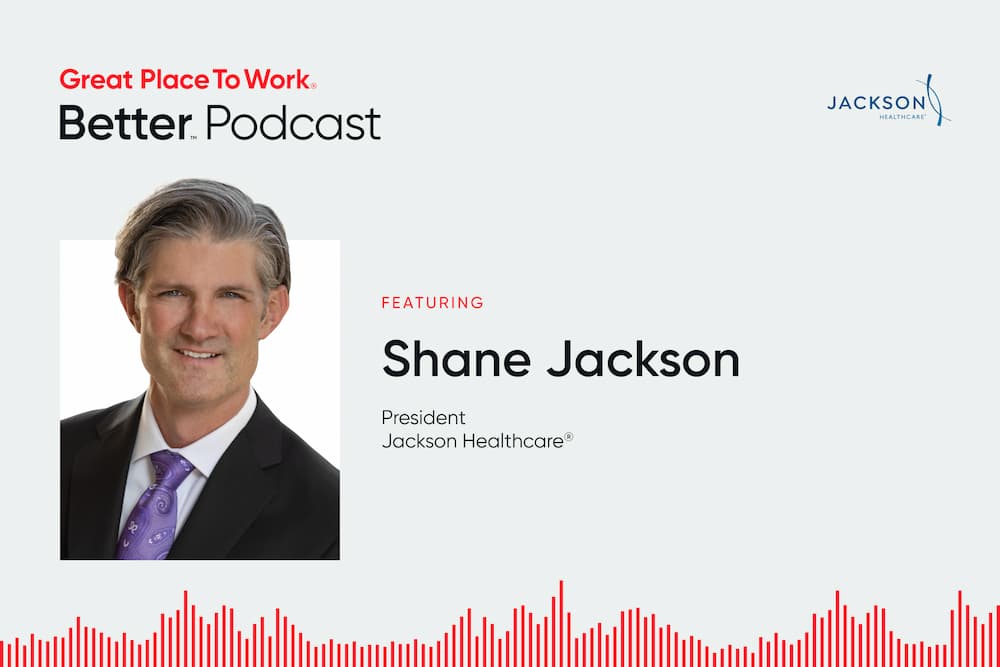Benefits of Company Culture, Company Culture, Employee Experience, Trust
TL;DR: There is no engagement without trust.
Your organization has just completed your annual employee survey. The scores are in, the benchmarks are loaded, and you’re left staring at your survey dashboard. What’s the signal that tells you what to do next?
If your first thought is engagement, you’re in good company — most HR leaders instinctively reach for engagement scores as their North Star metric.
But there’s another metric that better predicts whether your organization will retain top talent, maintain productivity during challenging times, and successfully navigate changes: Trust.
What is employee engagement?
Ask 10 HR professionals what employee engagement means, and you’ll get 10 different answers.
Is it high productivity? Low absenteeism? Slow turnover and high camaraderie?
Most people would agree it’s a combination of all these things, and more. They might say that an engaged workplace is where employees feel aligned with an organization and committed to its goals. Or where employees collaborate to ensure success and go beyond expectations.
While engagement is certainly good for business, most definitions are limited in that they’re focused only the needs of the organization — say, productivity for shareholder returns or reducing costs by retaining talent.
Plus, most engagement models assess environmental factors, not actual drivers of things like extra effort, loyalty and team collaboration. This presents two main reasons why engagement is an incomplete view of the employee experience:
1. Engagement alone doesn’t explain the why.
While engagement is often used as a primary indicator of employee experience, it doesn’t tell the full story. Without the intentionality of leaders and the foundation of trust, engagement is fragile — it fluctuates with surface-level perks or temporary morale boosts.
Trust + Engagement, on the other hand, is fueled by leadership behaviors and organizational culture. This combination creates engagement that is resilient, sustainable, and scalable — the kind that drives innovation, retention, and performance.
While leaders may not be able to “control” engagement in a direct, mechanical way, our research shows that high-trust leadership behaviors — like recognition, communicating transparently, and development — are strongly correlated with outcomes like extra effort and adaptability.
In other words, great starts with leaders, and trust is the mechanism that makes engagement meaningful and enduring.
2. Engagement is personal— and trust makes it scalable.
What energizes one employee might overwhelm another. One person may thrive in a collaborative, high-energy environment, while another may prefer quiet focus and autonomy. That’s why engagement alone can be difficult to act on — it reflects individual preferences, not systemic drivers.
But when engagement is grounded in trust, it becomes more than a personal feeling — it becomes a shared experience. Trust enables leaders to understand and respond to what matters most to their people, creating the conditions for meaningful, lasting engagement.
This is the essence of the Great Place To Work Effect: when leaders foster trust through consistent, inclusive, and empowering behaviors, they unlock engagement that is not only personal, but also scalable — and that drives performance across the organization.
As Marcus Erb, vice president of data science and innovation at Great Place To Work, explains, the Great Place To Work Effect is “the tangible and transformative impact of a workplace where people genuinely enjoy working together, trust their leaders, and feel inspired by their work.”
“The Great Place To Work Effect is that feeling when people are working well together, when it feels great to be part of a team, when you can bring your best work and do your best work — and both you and the business benefit. And that difference can be quantified and created. That’s what our data has shown us time and time again over the past 30 years at Great Place To Work.”
Going beyond engagement
Since 1992, Great Place To Work has been researching the Best Workplaces™ around the world via our employee survey, the Trust Index Survey. We’ve captured the workplace experience of over 130 million employees to find out what produces both a high-performing and healthy workplace.
The answer? Trust, not engagement.
Trust fuels performance
Trust is at the heart of every great workplace.
Trust is a universal currency. It transcends roles, departments, and demographics — creating a shared foundation for performance, innovation, and belonging.
It is the signal to employees that they are valued and heard — not just as employees, but as people. It’s demonstrated through recognition, transparency, and cooperation. Employees are encouraged to grow and develop and to be their true selves.
And when employees trust (and feel trusted by) their employer, it leads to tangible benefits for the organization:
- Drives revenue: The 100 Best Companies experience 5x greater revenue per employee. Cumulative stock market returns among the publicly held Fortune 100 Best Companies to Work For® are 3.5x greater than the market average.
- Leads to innovation: Among the Best Workplaces, 85% of employees report giving extra effort and 82% feel their colleagues are willing and able to adapt quickly to changes, versus 60% and 64%, respectively, at typical workplaces.
- Increases retention: High-trust workplaces have less than half the turnover of the typical U.S. workplace.
These outcomes are not coincidental — they are the result of cultures intentionally built on trust. This is the Great Place To Work Effect.
How the Great Place To Work Effect happens
A great workplace drives business success because it centers on the employee experience. When employees feel trusted, proud of their work, and connected to their colleagues, they bring their best selves to work — and that drives performance.
The result is a two-way partnership that benefits everyone. Employees feel seen and appreciated and genuinely enjoy where they work, and companies reap the benefits of a workforce driven by trust and respect.
Are employees engaged? Yes. But even better, they are happy, healthy, and whole people who can contribute to growing a business for the long-term, since they won’t be burnt out, feel left out because of unfair treatment, or practicing “presenteeism” instead of fully participating.
They look forward to coming to work, feel that they make a difference at work, and that management cares about them as a person, not just as an employee.
How to measure trust (and why you should)
Employee engagement metrics can be misleading. The Trust Index Survey is designed for data deep dives that go beyond general engagement.
For example, here are some common engagement metrics that may give you false signals without trust:
Voluntary retention and turnover
Employees staying long-term doesn’t necessarily mean they’re engaged. Some may stay because of inertia or ‘golden handcuffs’, not loyalty or trust.
Great Place To Work research has found that the top driver of intent to stay is feeling that your job has purpose, with purpose-driven employees 3.9x more likely to say they want to work there for a long time and 1.5x more likely to give extra effort.
Cross-checking intent-to-stay metrics with measures of productivity, purpose, and well-being can help you confirm if employees are staying for the right reasons.
Survey score averages
Averages can also mislead by hiding pockets of low trust within departments or teams. To pinpoint areas for improvement, segment your scores by leader or function, and cross-reference with indicators of high-trust leadership, such as Celebrating, Speaking, and Developing.
At typical workplaces, experiences tend to be less positive the closer you get to the frontline. But at the Best Workplaces, positive leadership is consistently experienced by at least 8 out of 10 employees even as you move down the management ladder, showing better consistency in experience across managerial levels compared to typical workplaces.
Training completion rates
Offering development opportunities is a great way to build trust, but only if employees continue to be supported after they’ve finished their training.
Compare completion rates with employee feedback about opportunities for innovation and sense of purpose. Employees who feel supported in their professional development are 1.9x more likely to find opportunities to experiment and 1.3x more likely to feel their role has purpose — which also drives retention, discretionary effort, and positive well-being.
Trust is your competitive advantage
Unlike engagement, trust is systemic and measurable. It’s also predictive — if your trust score drops, you’re likely to see metrics such as turnover go up.
When you shift from measuring engagement to measuring trust, you're not just collecting better data, you're building a foundation for better retention, innovation, and business performance.
Want to know how much you’re leaving on the table? Contract our team to find out how you can make the switch from engagement to trust.
Transform culture into business success
Let our Great Place To Work® Model guide your culture to drive performance. Start your journey with Great Place To Work today.












